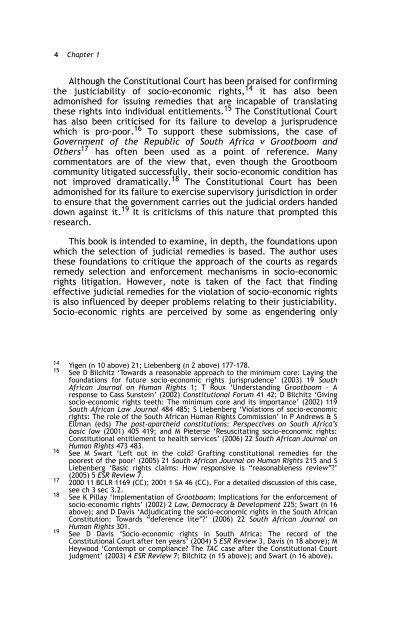LITIGATING SOCIO-ECONOMIC RIGHTS IN SOUTH AFRICA - PULP
LITIGATING SOCIO-ECONOMIC RIGHTS IN SOUTH AFRICA - PULP
LITIGATING SOCIO-ECONOMIC RIGHTS IN SOUTH AFRICA - PULP
Create successful ePaper yourself
Turn your PDF publications into a flip-book with our unique Google optimized e-Paper software.
4 Chapter 1<br />
Although the Constitutional Court has been praised for confirming<br />
the justiciability of socio-economic rights, 14 it has also been<br />
admonished for issuing remedies that are incapable of translating<br />
these rights into individual entitlements. 15 The Constitutional Court<br />
has also been criticised for its failure to develop a jurisprudence<br />
which is pro-poor. 16 To support these submissions, the case of<br />
Government of the Republic of South Africa v Grootboom and<br />
Others 17 has often been used as a point of reference. Many<br />
commentators are of the view that, even though the Grootboom<br />
community litigated successfully, their socio-economic condition has<br />
not improved dramatically. 18 The Constitutional Court has been<br />
admonished for its failure to exercise supervisory jurisdiction in order<br />
to ensure that the government carries out the judicial orders handed<br />
down against it. 19 It is criticisms of this nature that prompted this<br />
research.<br />
This book is intended to examine, in depth, the foundations upon<br />
which the selection of judicial remedies is based. The author uses<br />
these foundations to critique the approach of the courts as regards<br />
remedy selection and enforcement mechanisms in socio-economic<br />
rights litigation. However, note is taken of the fact that finding<br />
effective judicial remedies for the violation of socio-economic rights<br />
is also influenced by deeper problems relating to their justiciability.<br />
Socio-economic rights are perceived by some as engendering only<br />
14 Yigen (n 10 above) 21; Liebenberg (n 2 above) 177-178.<br />
15 See D Bilchitz ‘Towards a reasonable approach to the minimum core: Laying the<br />
foundations for future socio-economic rights jurisprudence’ (2003) 19 South<br />
African Journal on Human Rights 1; T Roux ‘Understanding Grootboom – A<br />
response to Cass Sunstein’ (2002) Constitutional Forum 41 42; D Bilchitz ‘Giving<br />
socio-economic rights teeth: The minimum core and its importance’ (2002) 119<br />
South African Law Journal 484 485; S Liebenberg ‘Violations of socio-economic<br />
rights: The role of the South African Human Rights Commission’ in P Andrews & S<br />
Ellman (eds) The post-apartheid constitutions: Perspectives on South Africa’s<br />
basic law (2001) 405 419; and M Pieterse ‘Resuscitating socio-economic rights:<br />
Constitutional entitlement to health services’ (2006) 22 South African Journal on<br />
Human Rights 473 483.<br />
16 See M Swart ‘Left out in the cold? Grafting constitutional remedies for the<br />
poorest of the poor’ (2005) 21 South African Journal on Human Rights 215 and S<br />
Liebenberg ‘Basic rights claims: How responsive is “reasonableness review”?’<br />
(2005) 5 ESR Review 7.<br />
17<br />
2000 11 BCLR 1169 (CC); 2001 1 SA 46 (CC). For a detailed discussion of this case,<br />
see ch 3 sec 3.2.<br />
18 See K Pillay ‘Implementation of Grootboom: Implications for the enforcement of<br />
socio-economic rights’ (2002) 2 Law, Democracy & Development 225; Swart (n 16<br />
above); and D Davis ‘Adjudicating the socio-economic rights in the South African<br />
Constitution: Towards “deference lite”?’ (2006) 22 South African Journal on<br />
Human Rights 301.<br />
19 See D Davis ‘Socio-economic rights in South Africa: The record of the<br />
Constitutional Court after ten years’ (2004) 5 ESR Review 3, Davis (n 18 above); M<br />
Heywood ‘Contempt or compliance? The TAC case after the Constitutional Court<br />
judgment’ (2003) 4 ESR Review 7; Bilchitz (n 15 above); and Swart (n 16 above).
















